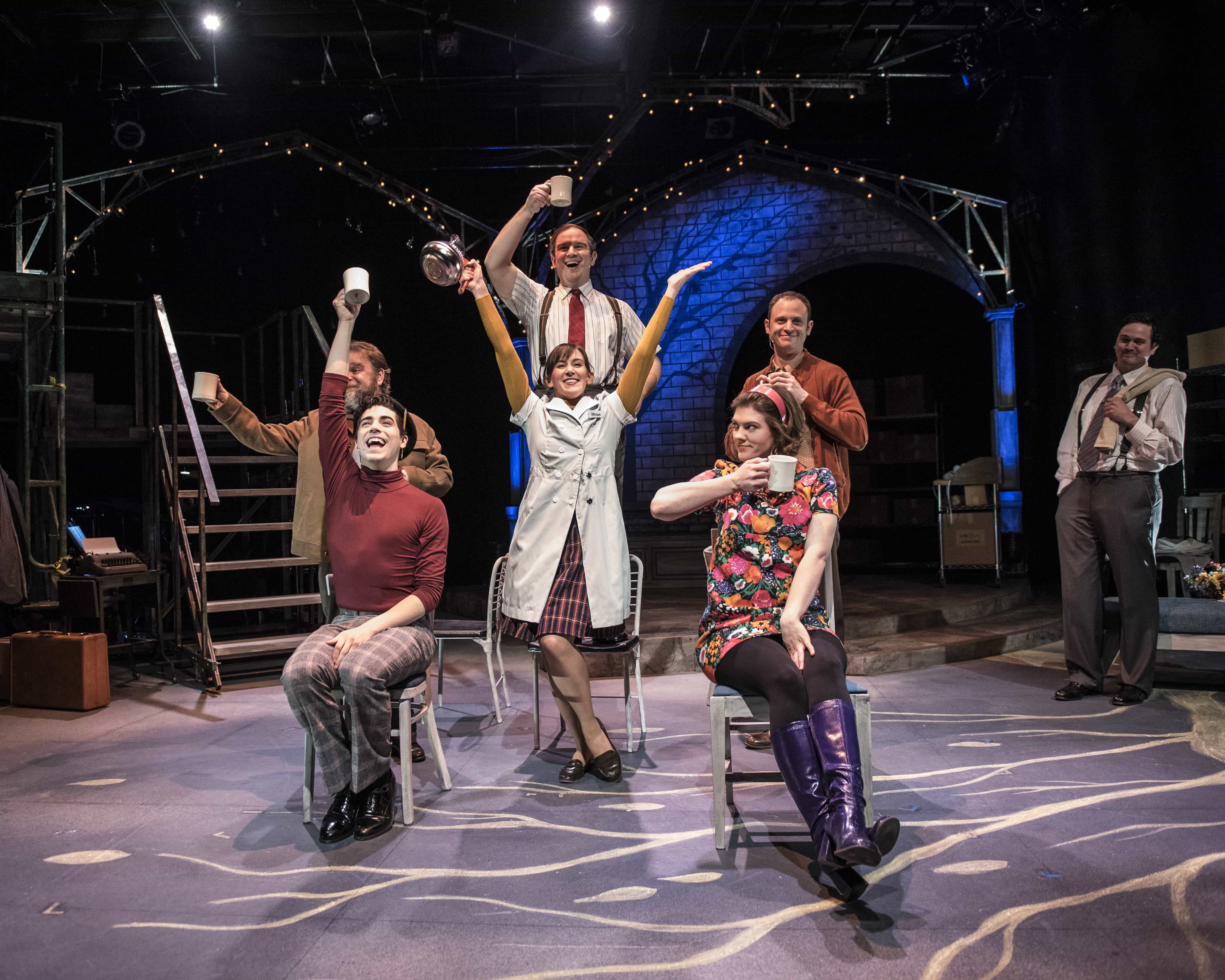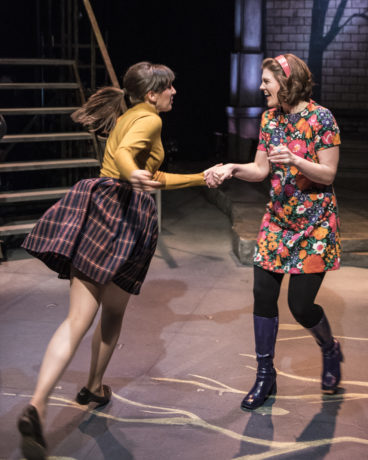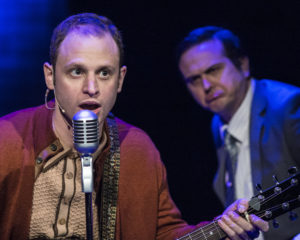Recipe for a vexing evening of musical theater: combine cuteness, sweetness, quirkiness, clever and funny dialogue, and a sprinkling of amusing and melodic songs. Add a heavy dose of sentimentality. Stir in a sauce of vague mysticism. Top it off with an abrupt, blatantly forced, change of mood near the end of the second act. Simmer for 2.5 hours. Result? A misconceived, burbling stew, but ah, the presentation! Exceptional performances by seven top-notch actor/singers; delightful comic timing; well-directed and choreographed movement; superb work by the small band; and a set design pleasing to the eye and highly flexible for the cast’s use. Such is 1st Stage’s production of Fly By Night, a 2011 musical by Kim Rosenstock, Will Connolly, and Michael Mitnick.

The show suffers from a fundamental structural flaw. “Show, don’t tell” is a longstanding cliché of playwriting, a truism for a reason. In Fly By Night, the Narrator (Jamie Smithson) tells and tells and tells and tells. For the most part, the other characters’ stories are not their own; the Narrator might as well own the copyright to them. He establishes the time frame for each scene, moving the chronology back and forth. He sets the mood for each scene, places the characters on stage, describes what is happening to them, and sometimes insists on repetition of actions they have already taken. It is possible to write a narrator role that is useful in setting the scene and tone of a play without becoming unduly intrusive (the Stage Manager in Our Town, for example). Fly By Night’s writers were unable to do so.
Nonetheless, Smithson’s timing, line readings, and singing are all spot on. As a bonus, he frequently switches, quite seamlessly, into various minor roles, such as the female leads’ father and mother and, most importantly, an old crone of a fortune teller. His is a bravura performance by any standard.

The key characters in the story are two small-town sisters in the Big City, Daphne and Miriam (Farrell Parker and Caroline Wolfson) who move to New York from the hinterlands. Daphne seeks Broadway stardom; Miriam is content with working as a waitress. Both are given pleasant songs, particularly “Stars I Trust” for Miriam and “I Need More” for Daphne. Both actors shine in these and other vocals, and they create vivid, distinct characters as well as a credible sibling dynamic.
Both sisters fall in love with the same man, the unprepossessing Harold McClam, an assistant sandwich maker (the typo is one of many misfortunes befalling his shop’s sign) and an aspiring songwriter who appears unable to get beyond his well-sung “Circles in the Sand,” an ode to indecisive sea turtles. Aaron Bliden fully inhabits the sweetly shy, awkward, emotionally torn character. He is is particularly good at playing Harold’s distance from his grieving father and increasing alienation from Daphne, the first of his two loves, as well as the process that leads him closer to Miriam.
The other actors have smaller, but very striking, roles. Ryan Manning plays Crabble, Harold’s employer, perpetually yelling at his bumbling assistant. He and Harold have the evening’s funniest song, “Eternity,” bemoaning their fate of forever, repetitiously placing meat, cheese, and lettuce between two pieces of bread. It’s a hoot, and an all-too-true commentary on mindless, dead-end jobs. Tiziano D’Affuso plays Joey Storms, a young, enthusiastic aspiring playwright who can no more finish a play than Harold can write another song. He casts Daphne, they rehearse for months, and he and Daphne become attracted (“What You Do to Me”). Like their fellow performers, Manning and D’Affuso sing beautifully, often – as do the others — becoming part of an ensemble supporting someone else’s solo.
The evening’s outstanding musical, emotional, and dramatic moment belongs to Harold’s father (Sasha Olinick). Through most of the play, he has been quietly mourning the death of his beloved wife, finding solace only in a recording of La Traviata. Near the end of the evening, he gets to tell his own story. His song, “Cecily Smith,” is a heartfelt remembrance of lifelong love, mercifully free from the preciousness and mystical musings that infect much of the show. The song’s “It’s not what you see, it’s who you see it with” is the most memorable takeaway line from the show.

A word about that mysticism. The narrator starts down this slippery slope, saying things like “The map of this story is both tiny and vast. And it is as simple and complex as choosing a path to travel and trusting it will connect to all other paths.” Then the fortune teller consults her electrified crystal ball and makes what turns out to be a precisely detailed prediction of the course of Miriam’s life. In Act 2, the much-mythologized 1965 Northeast power outage, which blacked out New York and adjoining states, becomes a cosmic occasion tied into the fabric of the universe, as well as the source of unexpected community feeling in the city.
What it amounts to is one more demonstration of humans’ unwillingness to accept that totally random things – both good and terrible – happen to people all the time. We suffer bizarre accidents. We fall in love with someone we wouldn’t ordinarily meet. A plane crashes, but someone with a ticket missed the plane. A vital young President is shot dead. There must be some reason, some pattern, some plan, behind all this, right? So we construct conspiracy theories (welcome to the grassy knoll), seek understanding through religion (cf. Thornton Wilder’s The Bridge of San Luis Rey), or, in the case of Fly By Night, rely on New Age metaphysics to make sense of the incomprehensible.
From reports of other productions, the power failure is sometimes staged with showy lighting effects, as the stars appear over the darkened city. The 1st Stage production did not include such an effect. Historically, stargazing during the blackout would have been limited by the bright full moon, and, while there were a few deaths in New York from other causes, despite the major traffic jams no one was killed in a car crash.
It is unusual, and somewhat unsettling, to encounter a production with such contradictory elements: a deeply flawed script joined to absolutely first-rate acting, singing, direction, and technical accomplishments. But perhaps this may be counted as an instance of the randomness that characterizes not only real life but theater as well.
Running Time: Two hours and 25 minutes, including a 15-minute intermission.
Fly By Night plays through May 6, 2018, at 1st Stage – 1524 Spring Hill Road, McLean, VA. For tickets, call 703-854-1856 or go online.




